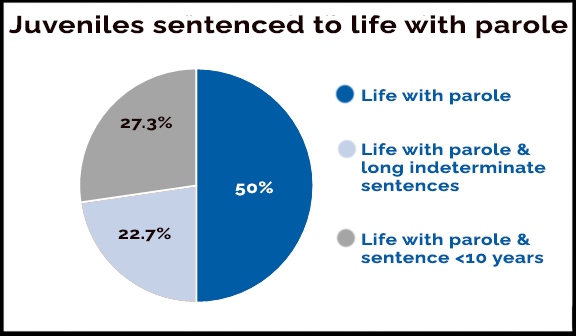The age of 18 has long been recognized as the legal age of adulthood. That means it is the age at which a person has both the rights and responsibilities of adulthood under the law. Before age 18, the law recognizes that a person does not have full legal rights or responsibilities; in the criminal justice context, and juvenile defendants are treated as having less than adult culpability. For example, U.S. Supreme Court decisions have abolished the death penalty for juveniles, and mandatory life without parole (LWOP) sentences for juveniles.
In the five years since the Supreme Court decided that the Miller decision disallowing mandatory juvenile life without parole was retroactive, many people sentenced to LWOP when they were juveniles have been released from prison.; Others are still working their way through resentencing. Additionally, 31 states have abolished the possibility of LWOP sentences for juveniles who have committed serious crimes. Hopefully, Michigan will join this growing number of states — an effort our event October 5th will highlight.
However, because the Miller decision was only about LWOP, it did not apply to anyone with a parole-eligible life sentence or a “natural life” term of years. As a result, many people who are de facto “sentenced to die in prison” and have not benefitted from the recognition of reduced culpability of juveniles. People sentenced to life with parole before 1992 are eligible for parole after 10 years, while those sentenced after 1992 are parole eligible after 15 years, due to changes that occurred during the “get tough” era.
To examine Michigan’s population of juveniles serving life sentences that did not benefit from Miller, we utilized data acquired through the Freedom of Information Act (FOIA), of the Offender Tracking Information System (OTIS) pulled in January of 2021. Since the data was compiled, nine people who were sentenced to life with parole as a juvenile have been released from prison. As of September 2021, we estimate there are 66 people incarcerated in Michigan prisons who have served at least 15 years of a life with parole they received as a juvenile. Half of those sentenced only have sentences of life with parole, an additional 27 percent have a life with parole sentence and an additional sentence(s) less than 10 years; the remaining 23 percent have a life with parole sentence and an additional sentence(s) longer than 15 years, which we refer to as a Long Indeterminate (LID) sentence.
 Examining this group, we found all of them were male, and most were non-white. Whites comprised 23 percent of the group, while non-whites comprised the remaining 77 percent, which aligns with the over-representation of people of color in those who are serving the most serious sentences. More than 60 percent of the group was 17 at the time of offense, 30 percent were 16, and those 15 years of age and under comprised the remaining 10 percent.
Examining this group, we found all of them were male, and most were non-white. Whites comprised 23 percent of the group, while non-whites comprised the remaining 77 percent, which aligns with the over-representation of people of color in those who are serving the most serious sentences. More than 60 percent of the group was 17 at the time of offense, 30 percent were 16, and those 15 years of age and under comprised the remaining 10 percent.
As stated above, we only included people who have served at least 15 years, meaning they are parole eligible for their life with parole sentence. The average amount of time served for this group is 32 years, and the most time served by someone in this group is 48 years.
Further, we found that most people, 68 percent, received a life with parole sentence for second-degree murder. The remaining 32 percent received a life sentence for an armed robbery, kidnapping, assault or first-degree criminal sexual conduct offense. Overall, almost 58 percent of people sentenced to life with parole took a plea, while 36 percent were convicted by a jury trial, and the remaining 6 percent were convicted by a bench trial. For those sentenced for a second-degree murder, 67 percent pled, 24 percent were convicted by a jury trial and 9 percent by a bench trial.
Advocating for those serving the longest sentences in Michigan prisons has long been the focus of Safe & Just Michigan, and our predecessor CAPPS. We will continue to examine the special concerns faced by this population to seek evidence based remedies.
You are invited to join us at noon on Tuesday, Oct. 5, 2021, in the Speaker’s Library inside the Michigan State Capitol for “31 States & Counting,” a discussion about the need for Michigan to abolish juvenile life without parole in Michigan, just as it has been eliminated in 31 other states. The event will focus on the business case for ending JLWOP and feature state and national criminal justice reform leaders and business advocates. All are welcome and lunch will be provided. Please RSVP to maggie@rbij.org to save your spot!

